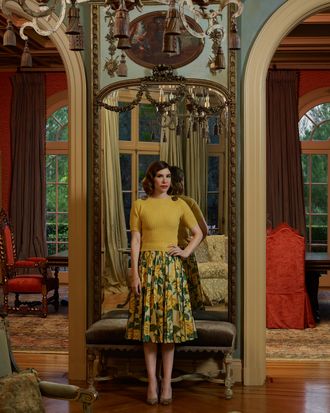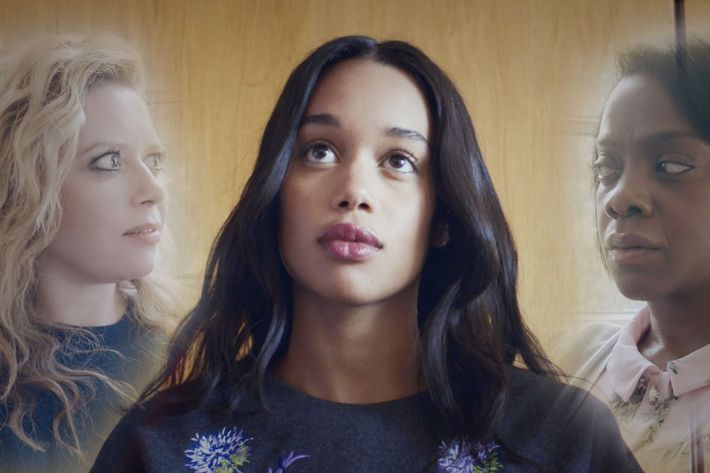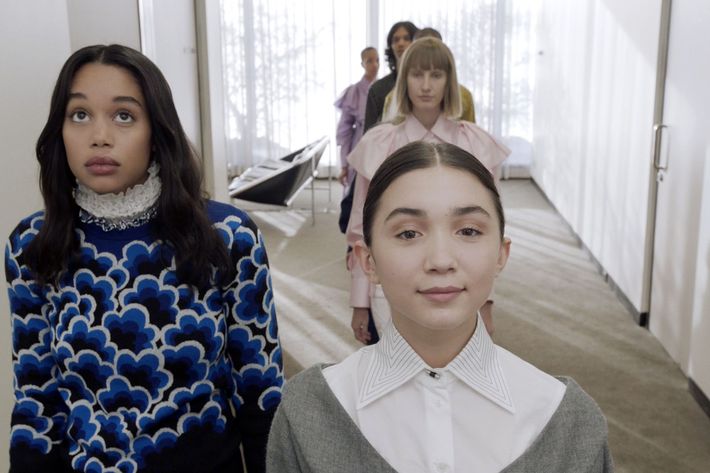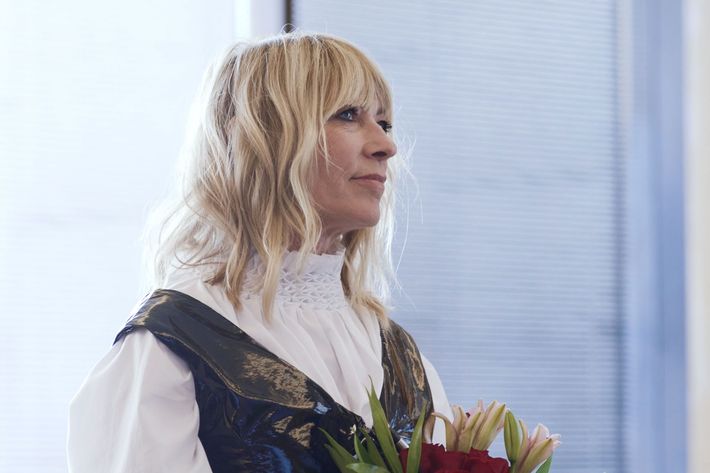
If you’re a woman of a certain age group and temperament, Carrie Brownstein might be your girl crush. Or maybe it’s Kim Gordon, or Natasha Lyonne. If you have a fondness for any or all of these women, you’ll probably want to see Brownstein’s directorial debut, The Realest Real. Made as a fashion film for Kenzo, it boasts a Brownstein-penned script, a Lyonne star turn, and a funny cameo from Gordon. Also appearing are two young talents: feminist actress and activist Rowan Blanchard, and Laura Harrier, who’s soon to make her mark in Spider-Man: Homecoming. The film is only six and a half minutes long, but it manages to cover a lot of ground: The story centers on a young girl (Harrier) who calls Lyonne “Mom” on Instagram and is transformed into her real-life daughter, with strange consequences.
In between a couple of breaks to tend to her dogs, Brownstein spoke to the Cut about what inspired the eerie, obsessive tone of the project and how it reflected her own feelings about her public persona.
What was it like to direct for the first time? Did it make you want to get involved in longer projects?
I had written scripts before for parts of Portlandia and also longer screenplays, but I had never seen a project to fruition through my own directorial point of view. So I was really grateful to Carol [Lim] and Humberto [Leon, of Kenzo] for that opportunity. In fact, right now we’re in production on Portlandia season seven, and I’m directing this episode and the next one.
But I was glad, I think, to try directing outside of the world of Portlandia. Because in some ways — and this is true of nearly all television shows — it becomes its own sort of infrastructure, its own machine, that operates by a certain set of fixed rules. [With The Realest Real], I was able to actually do something very separate from that and create my own sort of visual language for the film.

You have more established people alongside up-and-coming actors. How did you go about casting it?
Natasha Lyonne is a friend of mine and a friend of the Kenzo brand. I had written that role with her in mind, though I did not run that by anyone. When I was writing the part, I was using, and channeling, Natasha’s voice. I knew that she was going to be familiar with this world of fandom — Orange Is the New Black fans really insert themselves into the lives of the characters, into the narrative of the show, and it kind of becomes a world unto itself. So I felt like she would bring an understanding of the absurdity but also the tenderness that being responsible for those feelings means. Plus, she’s funny, and I needed somebody that could bring humor to that part, which she did.
Laura Harrier was someone who was brought to my attention in the process of casting, and I met with her in Los Angeles and was very impressed by her. She’s smart and she’s very kind, very down to earth. And Rowan Blanchard is kind of a dream. She’s so bright, a very brilliant actor. I had to take a moment on day one, just looking at the caliber of the cast for this small film and feeling very lucky that it had come together.

I have to watch a lot of fashion films as an occupational hazard, and they’re very rarely funny. I found this to be funny in a certain way. Not laugh-out-loud funny, but there was a wryness to it, like Portlandia. Were you consciously approaching doing a fashion film in an atypical way?
To be honest, I am the opposite. I have not seen very many fashion films, but I was pretty sure I was writing a script that was deviating pretty drastically from the form. And I think that’s a testament to Carol and Humberto’s desire to insert into the world of fashion — which is a world they take very seriously — this sense of cross-disciplinary influence. What they do is very much multidimensional and kind of bringing in elements that seem incongruous, like theater or automobiles, and just creating a landscape. They never had any expectation of me except to be true to my own sensibility and point of view. They purposefully reach out to people who aren’t coming up through the world of fashion or design so that the elements can combine in a way that is new.
I guess it’s good that I didn’t watch 20 fashion films as research or anything.
The film hinges on the idea that the characters have to go through with the hyperbolic things they say on social media, like “marry me,” and then turn them into reality. It takes this absurd idea to the limit. What kind of statement were you trying to make about what we’re doing in our virtual lives versus what we actually want?
I wasn’t trying to make any kind of didactic statement, or be strident with the film at all. I had gone to Paris to look at the fall collection that would act as inspiration for the film, and it had a lot to do with fandom and idolatry and the ways that, in some ways, the fans can transcend the physical form of the artist themselves. It just becomes almost a more pure form through admiration, simulation, even just imagination. I think that fans have always inserted themselves into the narrative they love. Because of technology and social media — and I include myself as a fan of things, of course — we can merge with idols in this more complex and multifaceted way. Someone can deconstruct a song or a visual, and you can impose yourself inside of that, which is really exciting, with memes or GIFs, and you can carry on this virtual dialogue with someone, and many times that becomes actually a cultural dialogue that I think we see play out, especially on Twitter, between performer and fans.
For fans, keeping that element of fantasy and projection alive is really crucial. Even though you’re pulling out these words that are domestic signifiers like “Mom” or “I love you” or “marry me,” it’s still about fantasy. I just wanted to explore the idea that it would be taken to this literal, mundane conclusion, and how that would feel. It was kind of more from that place than a finger-wagging “Social media will be the death of us all.”
Your fans have a very strong connection to you, but in a different way than someone like Beyoncé, where she almost doesn’t feel like a real person. People like Natasha, like Kim Gordon, like yourself are these archetypal girl crushes for a lot of people. How do you feel about being on the receiving end of that phenomenon?
I think I am lucky in that there is a relatability factor that keeps things within the world of sanity. But I will say that I think about this a lot — and in a way it’s separate from what ended up in the film — about how social media requires this level of likability. Niceness has this currency now. When I was growing up, someone could really be … perhaps even terrible. Someone I idolized music-wise, they might be this horrible person, or they might be an amazing wonderful person, but I wouldn’t know. I could create a mythology because I didn’t know what they ate for breakfast, I wasn’t seeing a picture of their backyard or kids or anything like that. It’s hard for me to get into; it’s too late for me [to cultivate] my “persona.” I’m always just kind of me.
You haven’t had time to build up a Garbo mystique.
I guess if I disappeared now, right after this interview, if I hung up the phone and deleted everything and didn’t come back for 25 years, I think people wouldn’t really care.
It would be great for this interview, though, because it would get a lot of buzz.
It would be good for you, yes. For me, I would come back in like 20 years and people would be like, “Who?”
I very much curate what I put online. I feel like it’s not very personal. I tend to stick with animals and landscapes, things that people can project things onto. Instead of myself.

I was interested in the way that you explore motherhood in this film, because you talk about your relationship with your mother so much in your book, and I’m wondering if that played into your script. The difference between the ideal mother we all wish we had and the actual day-to-day relationship where there’s tension — it seemed like there was a connection with your own personal experience.
I don’t know if there’s necessarily a specific through line there, but I definitely am interested in the notion of substitution and the ways that we transfer emotions and needs that we should be able to get from one person or one sphere and we move those over to something else. I think that people do that a lot with the technology versions of themselves. That they find ways online to substitute for a lacking in their real lives. I mean, that happens with technology and that happens interpersonally.
It’s interesting to me that “Mom” has become this term of endearment. It’s such a fundamental role in someone’s life. It also seems like people are picking such inappropriate moms for whatever reason. I always just think, That person is two or three years older than you! Reality is always coming crashing down into this world for me, which is, I think, part of the reason it’s funny, in turn. What a strange role to want to give to a rock star or a pop star. That’s what you want, you want them to be your mom? In some ways, there’s something very sweet and innocent about that. And then, also, the flip side of that is that it just feels almost bizarre and sinister. And I wanted to explore the ways that really could go wrong. You really want to take the biggest pop star in the world and have them remind you to get your teeth cleaned, to be stalking your Facebook page and asking you who all these people are?
It’s very absurd to me that “Mom” is part of that language of fandom now. But I love the way language works like that.
I’m curious about what you think about effortlessness. In fashion there’s an obsession with effortless style, but in other ways, too, there’s this aesthetic of trying to disguise the work that you’re putting into things and making it seem like everything comes easily to you. You’ve written about working really hard to be good at what you do, and you’re obviously successful in multiple fields. Do you feel pressure to downplay how hard you work? You don’t for me have this image of, I’m just an effortless person who’s sailing through life! You seem proud of the effort you put in.
Did you see that 30 for 30 ESPN film about Nancy Kerrigan and Tonya Harding? One thing that they explore was that Tonya Harding was sort of derided for her display of effort, that she had this musculature to her. You could see the muscles and sinew and effort on her face and in her body, which is a really perfect analogy for this kind of effortlessness that you’re describing. That kind of sterility and poise — although I can admire it from afar, I think that’s just not who I am or how I operate. I think that process is really interesting to me, and even though I think the final product can have the sheen to it that I want, or have a level of professionalism that I’d like to achieve, or even perfection if I’m lucky, although I wouldn’t really apply that word to anything I’ve done — I think the process and the effort and the struggle to me is just as interesting. And I don’t feel like I need to disengage from that or not explore it or not show it. I guess that’s the writer part of me that — and the part of me that’s just hyperanalytical, that I think the dissection of it is one interesting facet to it, as is the whole. I definitely am not in the effortless, carefree world.
Someone like Beyoncé, I feel like she embodies both those things. Like, how much she works is very apparent in everything she does. You see the sweat and the sheen, and I think that contrast is really beautiful. And it allows you to play in the grittiness of life, in the complexity of life. I think that, right now, is much more interesting than effortlessness.




